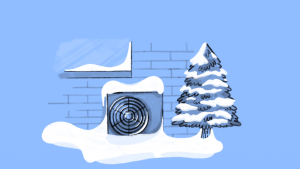Heat pumps are an innovative and environmentally friendly technology that is becoming increasingly popular in homes around the world. They provide efficient heating and cooling and have the potential to reduce fossil fuels. But how do heat pumps perform in cold climates, especially in icy winters? Let's take a closer look at this question.
The Workings of Heat Pumps
A heat pump is basically a device that moves heat from one place to another. It uses a refrigerant to extract heat from the outside air, ground or water. This heat is brought inside to heat your home. In the summer, the process can be reversed to cool your home.
The crucial feature of heat pumps is that they are efficient because they move heat instead of generating it. This means lower energy costs and fewer greenhouse gas emissions.
Cold Climates and Heat Pumps
A common question is whether heat pumps are effective in cold climates. The answer is yes, they can work, but there are some important considerations.
1. Air-Water Heat Pumps
In cold climates, air-water heat pumps can be more efficient than air-to-air heat pumps. Air-water heat pumps take heat from the outside air and transfer it to water flowing through your heating system. These heat pumps are often better suited for lower temperatures.
2. Supplemental Heating
In very cold climates, it may be necessary to have a secondary heating source, such as electric resistance heat or a gas boiler. This can support the heat pump when outdoor temperatures are extremely low.
3. Good Insulation
Regardless of the type of heat pump you choose, proper insulation of your home is important to minimize heat loss. Good insulation keeps heat in and improves the efficiency of your heating system.
4. Maintenance and Regular Monitoring
Heat pumps require regular maintenance and monitoring, especially in cold climates. Make sure your heat pump is properly maintained and any problems are addressed in a timely manner.
Efficiency in All Seasons
Heat pumps can operate efficiently year-round, even in cold climates, and here's why:
1. Two-in-one Functionality.
Heat pumps' ability to both heat and cool makes them ideal for all seasons. In summer, they extract heat from your home and carry it outside to cool. In the winter, they do the opposite.
2. Variable Capacity
Modern heat pumps adapt to the needs of your home. They can work harder on very cold days and less on milder days, keeping them efficient.
3. Energy Efficiency
Heat pumps are significantly more energy efficient than traditional systems. They can use up to 50 percent less energy, which translates into savings on your energy bills.
Conclusion
Heat pumps are an excellent choice for both hot and cold climates. They are environmentally friendly, energy efficient, and provide year-round comfort. However, it is important to remember that the performance of heat pumps depends on several factors, including the model, installation, and maintenance.
Overall, heat pumps are a promising technology that can help reduce the environmental impact of cold winters while keeping your home comfortable. Whether you live in a mild or icy climate, heat pumps are worth considering.





